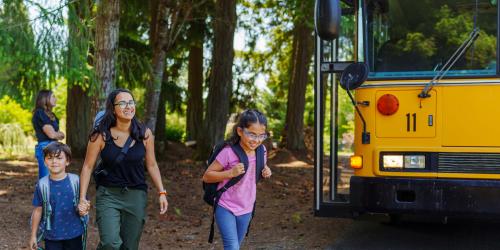For districts and schools hit hard by teacher shortages, there's only so much you can do alone in hiring and keeping high-quality teachers.
For the past 13 years I’ve served as the principal at Pasco High School, a large public school in a small city in Southeastern Washington.
This brief provides educators with the background, rationale and evidence for implementing an uninterrupted, 90-minute literacy block as part of a comprehensive approach to teaching reading in elementary schools.
"Changing the Conversation,” a new study from Education Northwest, looks at Highline Public Schools’ participation in the Road Map Project.
With ESSA placing states and districts in the driver’s seat when it comes to school improvement, what lessons can be learned from the School Improvement Grant (SIG) program?
Students with dyslexia are intelligent but struggle to "crack the code" of written language. What can educators do to best support them in the classroom?
When students are struggling in reading and writing, a promising approach is to emphasize the connections through strategies like sentence starters and mentor texts. Our author gives insights.
Spanish-speaking students—the largest group of language minority students in Washington state—take fewer advanced courses and earn lower grades in those courses than other language minority students and English-only speakers, regardless of whether they are classified as English learners.
Based on their experiences working with districts in Washington state, our researchers offer three recommendations for districts on using data to help ensure equitable educational experiences for students.
What skills can teachers learn to relate better to their students across cultures? Researcher Vicki Nishioka offers strategies to build teacher-student relationships and close the racial discipline gap.
Oregon’s Education Innovation Officer writes about the necessity to improve the state’s graduation rate and a few of the promising practices that could help Oregon reach its goal.
New study that uncovers challenges faced by rural schools with School Improvement Grants and shows the promise of technical assistance when it comes to implementing evidence-based strategies.
In a three-minute video, educators from small rural schools in the Pacific Northwest talk about the value of participating in a network.
Alaska's Superintendent of the Year breaks down the three principles that have helped shape his district: attention, building, and collaboration.
We wrestle with these issues of privilege, dominant culture, and expectations in North Clackamas schools. We’ve found that there is a strong interplay among instructional practices, equity, and leadership.















